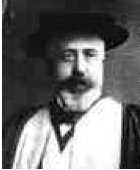- Vito Volterra
Infobox Scientist
name = Vito Volterra
box_width =
image_size = 140px
caption = Vito Volterra
birth_date =May 3 ,1860
birth_place =Ancona
death_date =October 11 ,1940
death_place =
residence =
citizenship =
nationality = Italian
ethnicity =
field =mathematics
work_institutions =University of Turin
alma_mater =
doctoral_advisor =
doctoral_students =
known_for =Lotka–Volterra equations
author_abbrev_bot =
author_abbrev_zoo =
influences =
influenced =
prizes =
religion =
footnotes =Vito Volterra (
May 3 ,1860 -October 11 ,1940 ) was an Italianmathematician andphysicist , best known for his contributions tomathematical biology .Born in
Ancona , then part of thePapal States , into a very poorJewish family , Volterra showed early promise inmathematics before attending theUniversity of Pisa , where he fell under the influence ofEnrico Betti , and where he became professor of rational mechanics in 1883. He immediately started work developing his theory of functionals which led to his interest and later contributions in integral and integro-differential equations. His work is summarised in his book "Theory of functionals and of Integral and Integro-Differential Equations" (1930).In 1892, he became professor of mechanics at the
University of Turin and then, in 1900, professor of mathematical physics at theUniversity of Rome La Sapienza . Volterra had grown up during the final stages of theRisorgimento when the Papal States were finally annexed byItaly and, like his mentor Betti, he was an enthusiastic patriot, being elected as a senator of the Kingdom of Italy in 1905. In the same year, he began to develop the theory ofdislocation s incrystal s that was later to become important in the understanding of the behaviour ofductile materials. On the outbreak ofWorld War I , already well into his 50s, he joined the Italian Army and worked on the development ofairship s underGiulio Douhet . He originated the idea of using inerthelium rather than flammablehydrogen and made use of his leadership abilities in organising its manufacture.After World War I, Volterra turned his attention to the application of his mathematical ideas to biology, principally reiterating and developing the work of
Pierre François Verhulst . The most famous outcome of this period is theVolterra-Lotka equations .In 1922, he joined the opposition to the
Fascist regime ofBenito Mussolini and in 1931 he was one of only 12 out of 1,250 professors who refused to take a mandatory oath of loyalty. His political philosophy can be seen from a postcard he sent in the 1930s, on which he wrote what can be seen as an epitaph for Mussolini’s Italy: "Empires die, but Euclid’s theorems keep their youth forever". However, Volterra was no radical firebrand; he might have been equally appalled if the leftist opposition to Mussolini had come to power, since he was a lifelong royalist and nationalist. As a result of his refusal to sign the oath of allegiance to the fascist government he was compelled to resign his university post and his membership of scientific academies, and, during the following years, he lived largely abroad, returning toRome just before his death.elected writings by Volterra
* 1910. " [http://historical.library.cornell.edu/cgi-bin/cul.math/docviewer?did=00750002&view=50&frames=0&seq=7 Leçons sur les fonctions de lignes.] " Paris: Gauthier-Villars.
* 1912. " [http://www.archive.org/details/theoryofpermutab004296mbp The theory of permutable functions.] " Princeton University Press.
* 1913. " [http://historical.library.cornell.edu/cgi-bin/cul.math/docviewer?did=01690002&view=50&frames=0&seq=9 Leçons sur les équations intégrales et les équations intégro-différentielles.] " Paris: Gauthier-Villars.
* 1926, "Variazioni e fluttuazioni del numero d'individui in specie animali conviventi," "Mem. R. Accad. Naz. dei Lincei" 2: 31–113.
* 1926, "Fluctuations in the abundance of a species considered mathematically," "Nature" 118: 558-60.
*1960. "Sur les Distorsions des corps élastiques" (with Enrico Volterra). Paris: Gauthier-Villars.
* 1930. "Theory of functionals and of integral and integro-differential equations". Blackie & Son.
*1931. "Leçons sur la théorie mathématique de la lutte pour la vie". Paris: Gauthier-Villars. Reissued 1990, Gabay, J., ed.References
*Judith R. Goodstein "The Volterra Chronicles: The Life and Times of an Extraordinary Mathematician 1860-1940" (History of Mathematics, V. 31) ISBN 0821839691. See [http://www.americanscientist.org/template/BookReviewTypeDetail/assetid/55508 review] in "American Scientist".
* Israel, G., 2005, "Book on mathematical biology" in Grattan-Guinness, I., ed., "Landmark Writings in Western Mathematics". Elsevier: 936-44.
*Citation
id =PMID :3045853
url= http://www.ncbi.nlm.nih.gov/pubmed/3045853
last=Israel
first=G
publication-date=1988
year=1988
title=On the contribution of Volterra and Lotka to the development of modern biomathematics.
volume=10
issue=1
periodical=History and philosophy of the life sciences
pages=37-49
*Citation
id =PMID :4950157
url= http://www.ncbi.nlm.nih.gov/pubmed/4950157
last=Scudo
first=F M
publication-date=1971 Mar
year=1971
title=Vito Volterra and theoretical ecology.
volume=2
issue=1
periodical=Theoretical population biology
pages=1-23External links3
*MacTutor Biography|id=Volterra
*MathGenealogy|id=33908See also
*
Volterra
*Volterra's function
*Smith-Volterra-Cantor set
*Lotka-Volterra equation
*Volterra integral equation
*Volterra series
*Product Integrals
Wikimedia Foundation. 2010.
